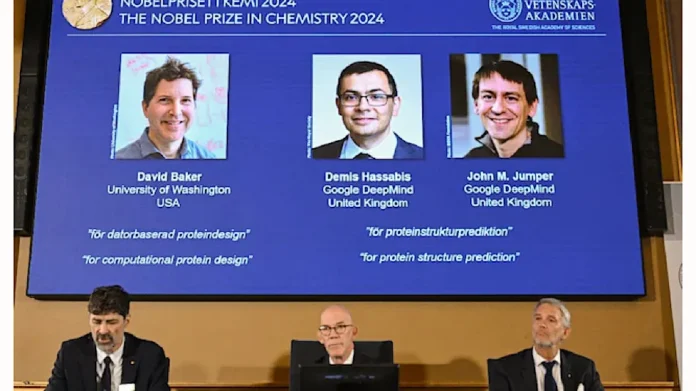STOCKHOLM, Oct 9: American scientists David Baker and John Jumper, along with British researcher Demis Hassabis, have been awarded the 2024 Nobel Prize in Chemistry for their groundbreaking work in revealing the intricate structures of proteins using computational methods and artificial intelligence (AI).
The Nobel committee recognized their contributions for “cracking the code of protein structures,” highlighting the profound implications of their work across various fields. Proteins, essential for life, are the building blocks of bones, skin, hair, and tissues. The ability to understand and predict protein structures has been a long-standing scientific goal, often referred to as a “50-year-old problem.”
David Baker, a biochemist from the U.S., was awarded half of the prize for his achievements in computational protein design. Baker, aged 62, has created entirely new types of proteins that have vast applications in fields such as pharmaceuticals, vaccines, nanomaterials, and even tiny sensors. “David Baker has succeeded with the almost impossible feat of building entirely new kinds of proteins,” the Nobel committee stated.
The other half of the prize was jointly awarded to Demis Hassabis, 48, and John Jumper, born in 1985, for their pioneering work in protein structure prediction. Both scientists, affiliated with Google DeepMind, developed the AI tool AlphaFold, which has transformed the way scientists approach protein structure prediction by using amino acid sequences to predict three-dimensional protein shapes. The AlphaFold database now contains the predicted structures of over 200 million proteins.
Their work was described as having “enormous potential” to revolutionize health, medicine, and other technologies. The AI breakthrough offers researchers a tool that can accelerate drug development and enhance the understanding of biological processes.
Heiner Linke, chair of the Nobel Committee for Chemistry, remarked that the laureates’ discoveries are foundational to understanding life itself. “Proteins are the molecules that enable life,” Linke said, emphasizing that understanding their shapes is crucial to deciphering biological functions.
The researchers’ achievements are expected to have long-term effects, providing solutions in drug design, disease treatment, and sustainable technologies.
The Nobel Prizes, first awarded in 1901, are given to individuals and organizations that have “conferred the greatest benefit on humankind,” as stipulated by Alfred Nobel, the prize’s creator.
Earlier in the week, the Nobel Prize in Physics went to American John Hopfield and British-Canadian Geoffrey Hinton for key advancements in artificial intelligence (AI). The 2023 Nobel Prize in Chemistry had been awarded for the discovery of quantum dots, used in various technologies, including televisions and medical imaging.
The prestigious Nobel announcements will continue with the literature and peace prizes, slated to be revealed later this week.


